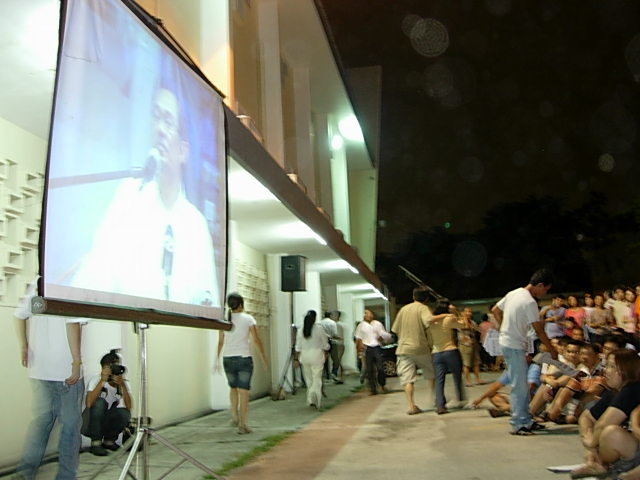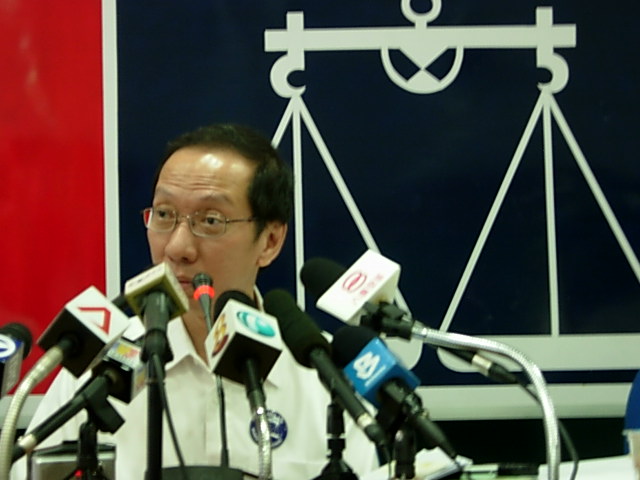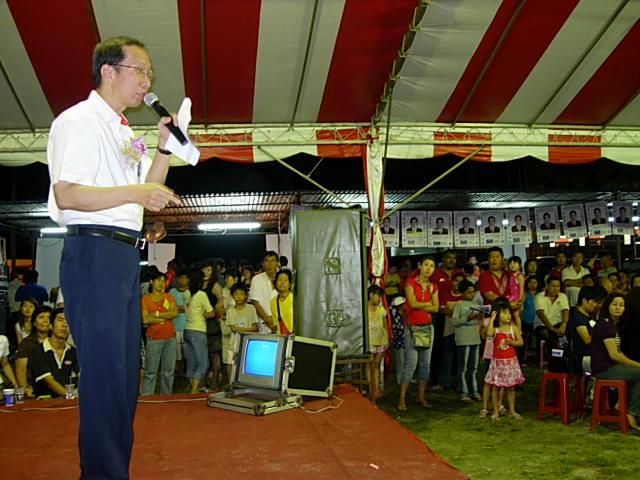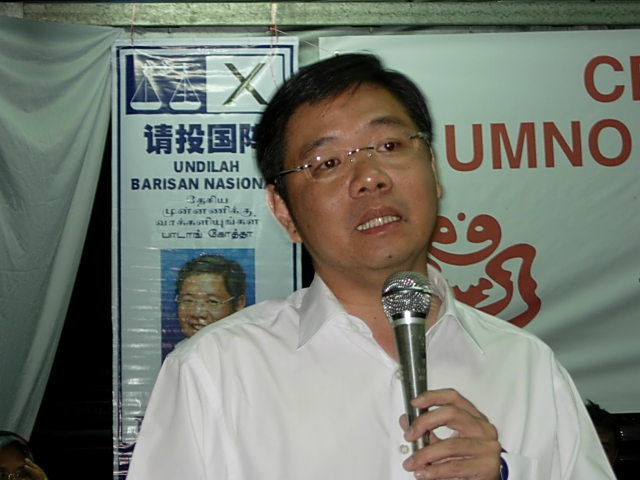
By Jacqueline Ann Surin
jacquelinesurin@malaysiavotes.com
PENANG: “I am very confident the people of Penang will take the lead in toppling the Barisan Nasional (BN) government,” Datuk Seri Anwar Ibrahim declared to boisterous cheers from the crowd.
The former deputy premier and current de facto leader of opposition Parti Keadilan Rakyat (PKR) wasn’t just massaging the ego of the close to 10,000-strong crowd that had gathered to hear him speak at a DAP-PKR ceramah on the Saturday night of March 1.
The multi-racial group of people who packed into the Han Chiang Indoor Stadium on Jalan Lim Lean Teng, and who spilled out into the open spaces around the stadium, would have cheered for Anwar in any case.
So strong is his star attraction as an accomplished orator, and more so as a former Umno leader who would have made it as prime minister if not for his unceremonious 1998 fall from power, out on sodomy and corruption charges, that half an hour after the ceramah began at 8pm, people were still rushing towards the stadium.
For certain, it wasn’t just Anwar who pulled in Penangites on that evening. It was the first time both the DAP and PKR – who have teamed up to regain a stronger opposition foothold in Penang – were on stage together. The other attractions for the night were DAP secretary-general Lim Guan Eng who is contesting in Bagan (P43), DAP national chairman Karpal Singh (Bukit Gelugor, P51), DAP newcomer and popular blogger Jeff Ooi (Jelutong, P50), and upcoming DAP leader Liew Chin Tong (Bukit Bendera, P48).
The electrically-charged atmosphere from the ceramah could be felt from the adjacent streets where Penangites who drove had to struggle to find parking. A family of six ahead of me practically jogged towards the stadium – the child among them impatiently dragging her guardian behind her – as they heard the crowd’s roar of approval from within the stadium grounds.
As the rain fell, and grew steadily heavier through the night, umbrellas popped open and people squeezed under the narrowly-shaded verandah outside the stadium. Nobody budged, not even those whose hair and clothes were wetly plastered to their bodies, as the fiery speeches continued into the night.
Penang’s potential
Penangites are in a position to determine the opposition’s future and the multi-ethnic vibrancy of the governing BN coalition, said Dr Bridget Welsh, assistant professor in Southeast Asian Studies at Johns Hopkins University-SAIS in Washington, DC, in her analysis in Malaysiakini.com.
Indeed, Penang is being watched closely as a hotly-contested seat in this 2008 general election. The DAP has made the state its battleground, with Guan Eng charging the way while simultaneously making his electoral comeback. The son of indefatigable opposition leader Lim Kit Siang, Guan Eng was unable to contest in the 1999 and 2004 elections because of an earlier court conviction under the Sedition Act. In this election, he is also contesting the state seat of Ayer Puteh (N23) in Penang.
Because of its predominantly Chinese population, the expectation is that any disenchantment with the ruling coalition where Umno dominates will be manifested by Penangites. The Chinese constitute about 45% of Penang’s population, the Malays 40%, Indians 9% and the rest are Others, outgoing chief minister Tan Sri Koh Tsu Koon said at a March 4 press conference at the Penang Gerakan headquarters in Macalister Road.
Penang is the only state in Malaysia whose government is led by a Chinese politician from Gerakan, which has ruled the state since 1969. But since the 1990 election, when Gerakan suffered at the hands of the DAP, there have been murmurings of the chief minister-ship going to Umno. After the 2004 election, which saw Umno’s position strengthened nationally, these demands grew more brazen.
This raised the ire of the Chinese population and has given the Opposition enough fuel to fire up charges of Umno’s dominance within the Penang BN. At every Opposition ceramah, the rallying cry has been for voters to reject Gerakan unless Penangites want the state to be dominated by Umno.
 So strong was the DAP’s jabbing at Gerakan’s purported inability to stand up to Umno that Koh, who is also Penang BN exco chairman, called for the March 4 press conference to refute the charges, by providing statistics on seat allocation and state exco membership among the different component parties in the state.
So strong was the DAP’s jabbing at Gerakan’s purported inability to stand up to Umno that Koh, who is also Penang BN exco chairman, called for the March 4 press conference to refute the charges, by providing statistics on seat allocation and state exco membership among the different component parties in the state.
Penang is also significant because it is the home state of both Umno president and caretaker prime minister Datuk Seri Abdullah Ahmad Badawi and Anwar, who the DAP is strategically working with to win over Malay support.
The DAP is contesting seven parliamentary and 19 state seats in Penang while PKR is contesting four parliamentary and 15 state seats.
“In 1990, the Opposition won 14 out of 33 seats in Penang and denied the Penang state government a two-thirds majority. Is it not possible this time, too?” Karpal thundered at the March 1 ceramah.
According to a seasoned journalist who has covered four general elections in Penang, the mood on the ground is “to teach the BN a lesson”. Any swing towards the Opposition in Penang will be a victory of sorts, considering that the DAP has only won one state seat each in the 1995, 1999 and 2004 elections, and PKR’s only seat was the Permatang Pauh (P44) parliamentary seat from the 2004 election.
The Indian vote
Most observers in Penang, including Koh’s aides, admit that the BN has lost the Indian vote, thanks in large part to “Uncle Sam” – the nickname for MIC president Datuk Seri S. Samy Vellu – but also because of the government’s mishandling of the Nov 25 Hindu Rights Action Force (Hindraf) rally that eventually led to five of its leaders being detained without trial under the Internal Security Act (ISA).
Word is that even Koh’s parliamentary seat of Batu Kawan (P46) is “shaky” even though initially, the BN thought it would be a relatively safe seat for Koh to make his transition to a federal position. This new constituency on the mainland has a total of 47,540 voters, of which 20.5% are Malay, 56.3% are Chinese, 22.8% Indian and 0.3% Others. Though still a minority group, the Indian population in Batu Kawan is significant.
 “I will not vote for the BN,” said an Indian woman who was among 300 others who attended a March 3 dinner gathering with Koh and other Gerakan leaders at Taman Tambun Indah, Bukit Tambun, where the people were not just feted to a free buffet but were also treated to free live entertainment.
“I will not vote for the BN,” said an Indian woman who was among 300 others who attended a March 3 dinner gathering with Koh and other Gerakan leaders at Taman Tambun Indah, Bukit Tambun, where the people were not just feted to a free buffet but were also treated to free live entertainment.
“What are you doing at this gathering then?” I asked. “My husband’s a Gerakan member,” she said. “He won’t vote the BN either,” she said, and then perhaps realising the implications of her admission, quickly added, “But a person’s vote is confidential, even between husband and wife.”
Hindraf has become one of the battle cries of the Opposition. At a DAP ceramah in Taman Senangin, Prai on the same night, a banner showing the detained Hindraf 5 was stretched behind the speakers. “Release them from ISA,” it said.
Koh’s opponent for the Batu Kawan seat, DAP’s Dr P. Ramasamy, made a convincing plea for the release of the Hindraf leaders. “I’m asking the BN, our Prime Minister, to release our five leaders. What was their crime? They only expressed their views about the Indians’ plight. If they’ve broken the law, charge them in court! Why detain them under the ISA? Is it because the government has no basis at all for their detention?” Ramasamy challenged.
The roughly 200-strong crowd, mostly Indian, in flood-prone Taman Senangin applauded Ramasamy’s point. It is a point which has been raised repeatedly by other Opposition leaders – including former ISA detainees such as Guan Eng, Karpal and Anwar.
The other issues have been the rising cost of goods and services, the destruction of Hindu temples, the rising incidence of body snatching by religious authorities because of purported conversions to Islam, the Lingam video clip, the state of the judiciary, and even the yet-to-be solved murder of Mongolian Altantunya Shaariibuu.
A former Universiti Kebangsaan Malaysia professor, Ramasamy’s university lectures have now given way to punchy and impassioned ceramahs in open air community spaces. The mostly Indian crowd was smaller than the turnout at Koh’s earlier dinner gathering, but there’s no free food or entertainment, so the interest in hearing out the Opposition seemed more genuine. “The former chief minister is throwing dinners for the people. They (the BN) are mistaken this time round that they can buy people in this way,” Ramasamy told MalaysiaVotes.com.
But while Hindraf and the ISA detention of its leaders have clearly captured the imagination of the Indian community nationwide, including in Batu Kawan, Koh would not name Hindraf nor openly call for the release of the Hindraf 5. “The sentiments from the Indian community (in Batu Kawan) have been more positive than we anticipated. Still, there are some localities where there, the sentiment is negative because of long-standing issues,” he said at the March 4 press conference, citing the problems faced by one Tamil school.
On the ISA detention of the Hindraf 5, Koh said detention without trial could be justified in certain circumstances. When pushed, he added: “I’m not saying [detention without trial] must be extended generally but I’m just telling you that the principle against detention without trial has to be moderated by real life.”
Earlier, he said that if asked by the Indian voters in Batu Kawan about the Hindraf 5, his reply would be: “I can tell the people that I have discussed the matter with the federal authorities. I raised this issue. I’ve told the federal authorities that it is an emotional issue among certain segments of the Indian community. I’ve raised it and I’ve expressed my views but I would rather not say it publicly at this moment.”
Neither Koh nor Ramasamy will state what their chances are of winning Batu Kawan. In the 2004 election, Gerakan candidate Huan Cheng Guan won with 17,097 votes in a three-cornered fight against PKR’s Law Choo Kian and DAP’s Tanasekharan a/l Audherapady. But the combined votes of both Law and Tanasekharan were just 2,446 short of Huan’s votes, and in this 2008 election, it’s just a straight fight between Gerakan and the DAP.
“It is a new seat that was only formed in 2004. Even then, we only won by more than 2,000 votes (compared to the combined votes of the other two candidates). Hence, it is not a safe seat for the BN. It is not a sure win for me,” Koh said.
Ramasamy said he had been getting very positive responses from the ground but it was hard to tell if that would translate into votes. “I’m not sure of defeating Koh but I’ll not make it easy for him.”
Promises
The BN’s campaign strategy in Penang is sharply focused on development promises. Apart from the extensive media ads detailing the Penang government’s development projects and achievements, Koh himself has promised the Batu Kawan constituency a new bridge and community hall, a new lot to extend a Chinese school, and the widening of a road and a roundabout.
 At a March 2 ceramah by Teng Chang Yeow, the Gerakan incumbent for the Padang Kota state seat promised the residents of the Jalan Zainal Abidin low cost flats, he would take up their request for Astro to be installed in their building if they voted for him. “Even the poor deserve entertainment,” he noted. The 50-odd residents at the ceramah were also promised the installation of closed circuit TV cameras in their blocks by the three-term state assemblyman, who is in the running to be Penang’s next chief minister. Asked what his position was on the contentious Penang Global City Centre development project and how he would address the issue if it was raised in the state assembly, he told MalaysiaVotes.com: “It’s not in my constituency. It doesn’t affect the voters here.”
At a March 2 ceramah by Teng Chang Yeow, the Gerakan incumbent for the Padang Kota state seat promised the residents of the Jalan Zainal Abidin low cost flats, he would take up their request for Astro to be installed in their building if they voted for him. “Even the poor deserve entertainment,” he noted. The 50-odd residents at the ceramah were also promised the installation of closed circuit TV cameras in their blocks by the three-term state assemblyman, who is in the running to be Penang’s next chief minister. Asked what his position was on the contentious Penang Global City Centre development project and how he would address the issue if it was raised in the state assembly, he told MalaysiaVotes.com: “It’s not in my constituency. It doesn’t affect the voters here.”
Similar to the BN’s promises of addressing the people’s development needs, the DAP’s Ramasamy promised to attend to flood-mitigation measures in the constituency and provide land for Hindu temples and Tamil schools if he was voted in. But, in addition to these, Ramasamy also promised to expose development scandals and corruption, go up against racism and Umno, fight for the cultural, religious and economic rights of all communities, and push for democratic rights.
Development promises on their own are tried and tested methods of gaining votes, especially since Malaysians, like Singaporeans, subscribe to developmentalism, Universiti Sains Malaysia political science professor Francis Loh said at a Feb 29 talk at the Pulau Tikus Catholic Church.
Because of rapid economic growth, Malaysians have been enjoying a better lifestyle, he explained. “And we’re told that if we change government, there will be trouble and the economy will collapse and our lifestyle will be jeopardised. So, we think, ya, it’s better to not vote against the BN.”
Development does not equal democracy, Loh stressed. And yet, he noted, developmentalism is reinforced by politicians with the help of the media, and most Malaysians buy into that. “Political parties in Malaysia shy away from politics. Ironically, they only want to talk about development instead of democracy, justice, equal rights, freedom and people power.”
At the same time, he added, Malaysians are loathe to get involved in non-electoral politics such as signing a petition, attending a protest, or exercising one’s right to organise and attend a public gathering. “It’s very important to demand more than developmentalism,” he said. If not, he surmised, Malaysians deserve the government we get.
In Penang, with the BN’s resources spent in this election campaign on making development promises, and for the most part evading the thorny political issues that beleaguer it, how Penangites vote on March 8 will indeed indicate what it is that finally matters to them.